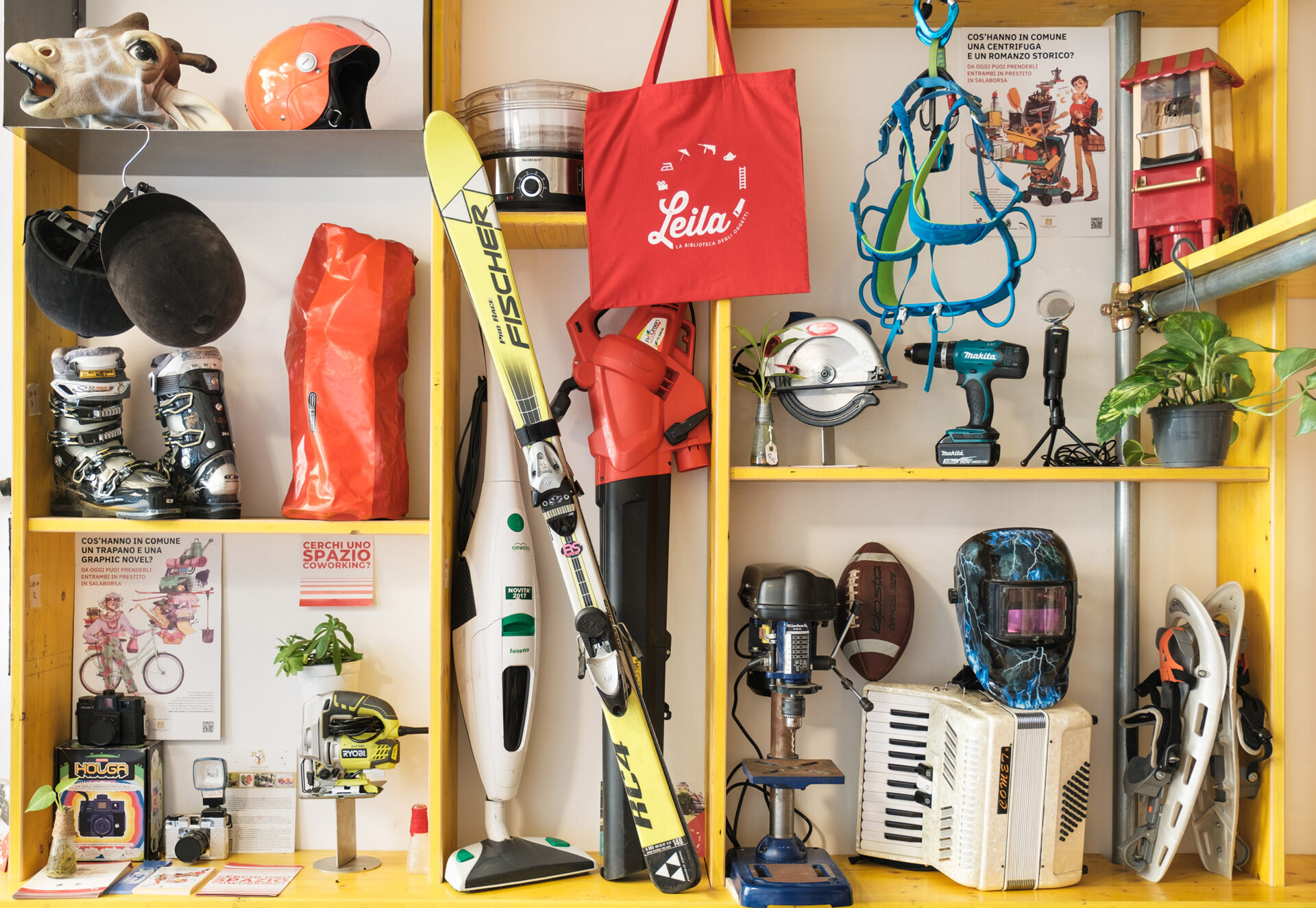Best practices
04 April 2025
Leila: Italy’s First Library of Things
Best practices
04 April 2025
Partnerships
Regenerative Green Transition
Proximity and social economy
+13 more
Login / create an account to be able to react

As Italy’s first Library of Things, Leila champions a collaborative, eco-conscious model by enabling communities to borrow tools, appliances, and gear instead of buying them. This approach reduces waste, lowers costs, and builds trust through shared responsibility. Through object sharing, Leila redefines ownership and prioritises access over possession, strengthens social ties and empowers communities. Its innovative vision demonstrates how resource-sharing creates a more connected, equitable, and sustainable society.
EURICSE
Topics
Albania
Armenia
Austria
Belgium
Bosnia and Herzegovina
Bulgaria
Croatia
Cyprus
Czechia
Denmark
Estonia
EU-27
Finland
France
Georgia
Germany
Greece
Hungary
Iceland
Ireland
Italy
Kosovo
Latvia
Liechtenstein
Lithuania
Luxembourg
Malta
Moldova
Montenegro
Netherlands
North Macedonia
Norway
Poland
Portugal
Romania
Serbia
Slovakia
Slovenia
Spain
Sweden
Switzerland
Türkiye
Ukraine
Local Authorities
National authorities
Regional Authorities
SMEs (a company with less than 250 employees)
Social Economy Entity
-
Thematic area
-
-
Partnerships
-
Regenerative Green Transition
-
-
Interlinkages with other sectors
-
-
Proximity and social economy
-
-
Action areas and keywords
-
-
Buy social
-
Circular Economy
-
Clusters (including Cluster of social and ecological innovation)
-
Creating financial incentives and supportive regulation for green and circular social economy business models
-
Innovation
-
Local Markets
-
New business models
-
New business models – the platform economy
-
Other action area
-
Responsible (Public) Procurement
-
-
Ecosystem focus
-
-
Proximity economy
-
Social economy
-
-
Scope of activity
-
-
Local/neighbourhood
-
Share
What is Leila?
Leila is a growing network of Libraries of Things across Italy, inspired by the success of Leila Bologna. These innovative spaces allow people to borrow and lend high-quality objects, providing a free service that promotes sustainable consumption, cost savings, and responsible resource use. By reducing unnecessary purchases, Leila supports a sharing-based economy that minimises waste and fosters collaboration.
More Than Just a Sharing Network
Leila is not just a simple lending service; it is a cultural movement that anyone can join. Whether in a business, university, organisation, or local community, setting up a Leila hub helps spread the culture of sharing as a practice of mutual trust. Since 2016, Leila has aimed to encourage responsible consumption, optimise resource use, reduce waste, and strengthen community ties.
Leila goes beyond merely facilitating the exchange of goods. It plays a critical role in fostering social cohesion and active participation in society, encouraging people to choose sustainable options. By nurturing human relations, active citizenship and community engagement, Leila is helping create a network of circularity where resources are shared, reused and given new life. This approach not only benefits individuals but also contributes to a more sustainable and resilient future by creating a system where people can actively contribute to positive social and environmental change.
A Sustainable Investment in the Future
The concept behind Libraries of Things is simple. Resources are shared and collectively used rather than individually owned. These spaces provide access to items without the need for purchase, leading to:
- Economic savings – avoiding the cost of rarely used items
- Environmental sustainability – reducing production and consumption
- Resource optimisation – extending the life cycle of objects
- Community engagement – fostering social connections and cooperation.
Why Buy When You Can Borrow?
Many of us own items purchased for one-time use that now gather dust. Whether it is a drill, a kitchen appliance, or camping gear, these objects take up space and represent wasted resources. The best economic and environmental solution is to share them. This is precisely the role of Libraries of Things.
Leila, Italy’s first Library of Things, emerged in Bologna as part of the sharing economy movement, offering a practical solution to overconsumption. Borrowing rather than buying saves money, reduces waste, and prevents unnecessary purchases. These initiatives not only encourage the sharing of physical goods but also promote knowledge exchange.
How It Works
Most Libraries of Things operate on a membership basis, allowing users to borrow items for a limited time. At Leila, for example, a membership costs €20 initially and €15 per year thereafter, with users required to share at least one personal item. Other libraries, such as Zero in Palermo, charge €10 annually, allowing members to borrow two items at a time for up to a week.
Items can either be donated or remain the property of the original owner for as long as they wish. The success of these initiatives depends on the availability of high-quality, well-maintained items. Antonio Beraldi, founder of Leila and CEO of the Leila startup, aims to replicate this model across Italy, redefining ownership and encouraging the use of underutilised items.
Building Trust and Community
Sharing services thrive on trust. Members are responsible for the items they borrow, which strengthens accountability and fosters positive relationships within the community. Many Library of Things also offer workshops on maintenance and repair, ensuring that items remain in good condition and that members develop practical skills.
Through these interactions, they contribute to stronger social connections and deeper sense of belonging. The act of lending and borrowing builds a foundation of trust, making these spaces more than just places to share physical goods but also hubs for human connections and sustainable action.
Overcoming Barriers to Sharing
Despite their success, Libraries of Things face challenges. Borrowing requires effort – collecting, transporting, and sometimes waiting for an item to become available. Moreover, some people struggle with the idea of lending personal items rather than simply donating unwanted belongings. Overcoming these barriers requires a cultural shift towards valuing shared access over individual ownership.
The Future of Libraries of Things
Despite initial scepticism, these initiatives are proving effective. A study by Barclaycard Payments highlighted a growing preference for second-hand and shared items across multiple sectors, including childcare, fashion, and fitness. In 2024 alone, the Library of Things opened three new locations in the UK, bringing the total to 19.
In Bologna, Leila’s partnership with the local government has been instrumental in its expansion. The city now provides free membership to public library users, covering the cost of registration and broadening accessibility. Leila aims to establish a presence in all neighbourhood libraries by 2026.
A Scalable and Replicable Model
Leila is now providing tools and guidance for organisations, schools, and businesses interested in setting up their own Libraries of Things. Collectives, universities, and even companies are exploring these spaces as a sustainable workplace benefit. As the movement continues to grow, the culture of sharing is set to become an integral part of Italy’s transition towards a more sustainable and collaborative future.
Comments (0)
See also
-
30
Financing the Ecosystem Recap: December – January
- Categories
- Partnerships Regenerative Green Transition Skills +68 more
-
21
PSE Platform Ambassador highlight: Viktorija Bražiūnaitė, LISVA
- Categories
- Partnerships Regenerative Green Transition Skills +68 more
-
21
PSE Platform Ambassador highlight: Erdmuthe Klaer, REVES
- Categories
- Partnerships Regenerative Green Transition Skills +68 more




